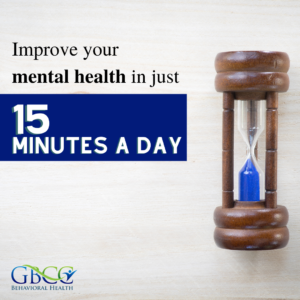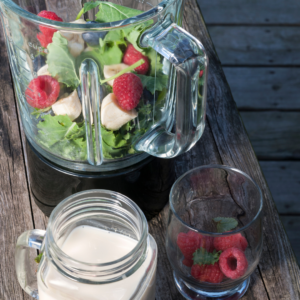Nearly a quarter of all Americans say they make a New Year’s resolution, but only a third of them admit to actually keeping to them for an entire year. Setting and achieving resolutions in a new year can prove to be challenging if the goals are too unrealistic in expectation or require a drastic overnight change in habits and mindset. Here is a list of things you can do to improve mental health in just 15 minutes a day.

For those looking to start small, there are some activities you can do for just a few minutes each day that can greatly improve your overall mental health. You don’t have to start these in January, either. By dedicating just 15-minutes a day towards small-but-well-meaning intentions, you will get a satisfying return on your overall mental well-being.
15 Minute-a-Day Activities that Will Improve Your Mental Health
Writing in a journal each day.
In a 2006 study, nearly 100 young adults spent 15 minutes journaling or drawing twice a week about a stressful event or writing about their plans for the day. The people who journaled saw the biggest reduction in symptoms of depression, anxiety, and hostility, particularly if they were distressed to begin with. Try writing a short paragraph about your day and the feelings you had as a way to be more mindful and present in your daily life. Taking time to have more awareness of our thoughts, feelings and environment allows us to be more at peace with our own life experiences.
Reduce the amount of time you spend daily looking at social media.
A 2018 study by UPenn was the first of its kind to establish a causal relationship that social media usage increases feelings of depression and loneliness. The study found that participants who limited the amount of time they went on social media to just ten minutes per app daily showed a significant decrease in loneliness and depression. Slight decreases in anxiety and fear of missing out (FOMO) were also observed. Most smartphones now offer app “time limits” to help monitor how long you spend scrolling these apps. Look at the average amount of time you spent on social media last week and allot the same amount of time this week, minus 15 minutes. Gradually reduce the time each week to wean yourself off a potentially detrimental habit.
Stop checking work emails during non-work hours.
A 2018 study entitled, “Killing me softly: electronic communications monitoring and employee and significant-other well-being,” researchers at Virginia Tech found that even being expected to check work email during non-work hours caused workers (and their spouses) to experience anxiety. Researchers explain the consequences for expecting employees to always be “on” is, in fact, compromising the employee’s and their family’s mental health. Make a conscious effort to stop reading work emails after a certain hour and give yourself back time to be present with loved ones.

Skip that afternoon cup of coffee.
85% of Americans consume coffee each day. It’s also not uncommon for workers, stay-at-home parents or even retirees to want to reach for a cup during an afternoon lull in energy. However, researchers indicate you may want to consider other less caffeinated options for an afternoon jolt. Studies show excessive caffeine consumption can cause symptoms similar to psychiatric conditions including sleep and anxiety disorders, increasing hostility, anxiety, and psychotic symptoms. One study from Harvard Medical School noted how caffeine use yields physical symptoms of anxiety, complete with nervousness, restlessness, sleep issues, increased heart rate and gastrointestinal problems. Experts recommend drinking healthier alternatives, such as fruit smoothies that take less than 15-minutes to prepare, can give you a more natural energy boost, and without the onset of feelings that closely mirror anxiety.
Take a 15-minute walk each day.
Many people believe they need to commit to an intense workout regime to improve their physical well-being. Believe it or not, there are health benefits to adding even the smallest amount of movement into your 24-hour day. One study even found that walking outside just 15 minutes a week left people feeling more socially connected, and reporting bigger increases in positive emotions — including prosocial emotions such as gratitude and compassion, and also joy — while they were walking. The boost in prosocial emotions, specifically, carried through into everyday life.
By choosing one or more of the above activities, you may be able to improve your mental health in just 15 minutes a day. The mental health professionals at GBCC Counseling Centers can help you explore small changes you can make to improve your mental health and help you work toward them. In addition to individual therapy sessions, we also offer various telehealth group therapy sessions three days a week. To schedule an appointment, call 410.760.9079.
Sources:
https://greatergood.berkeley.edu/article/item/how_journaling_can_help_you_in_hard_times
https://www.healthline.com/health/caffeine-and-anxiety#caffeine-and-anxiety
https://www.inc.com/jessica-stillman/happiness-loneliness-study-awe-walk.html
